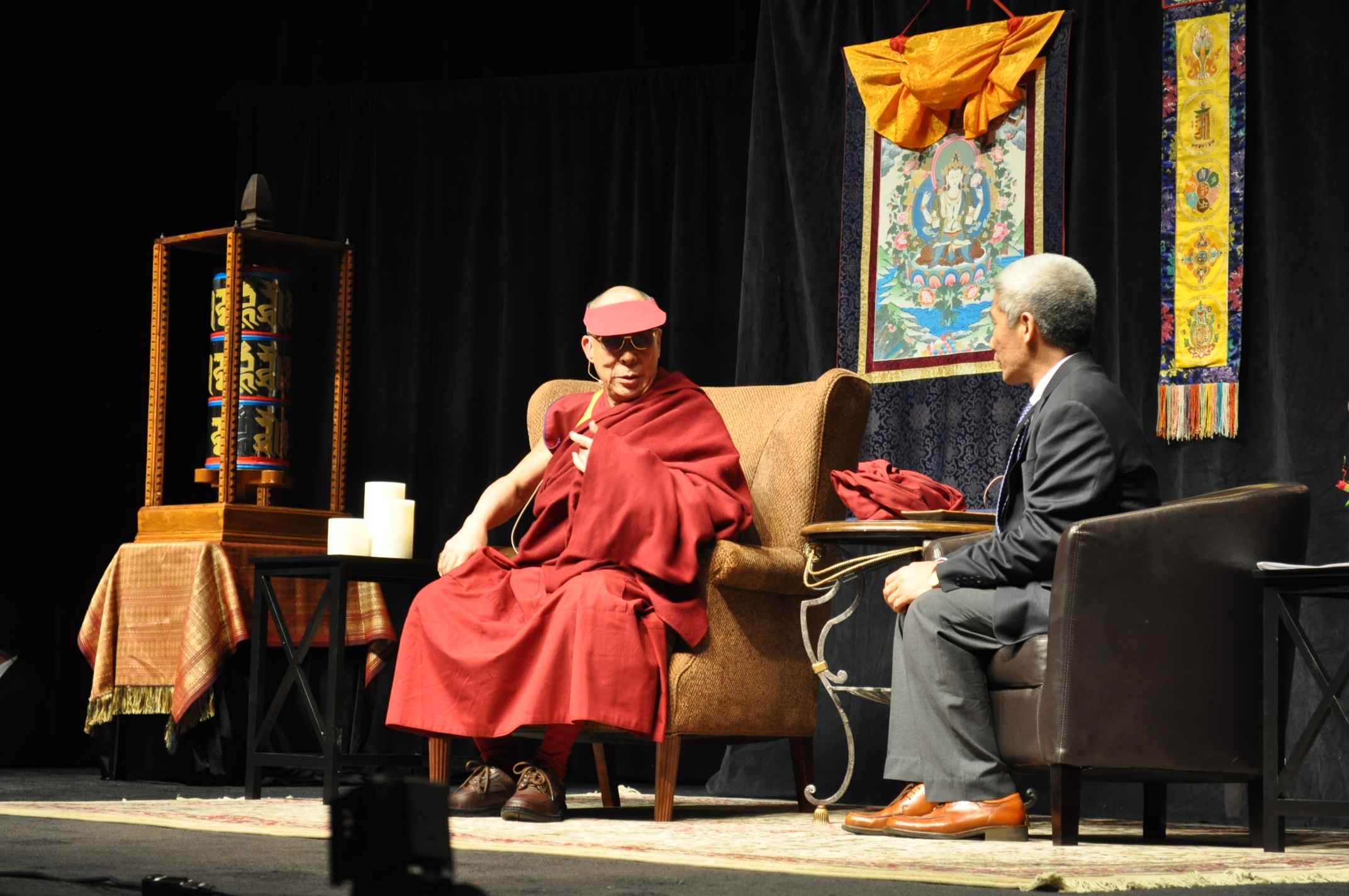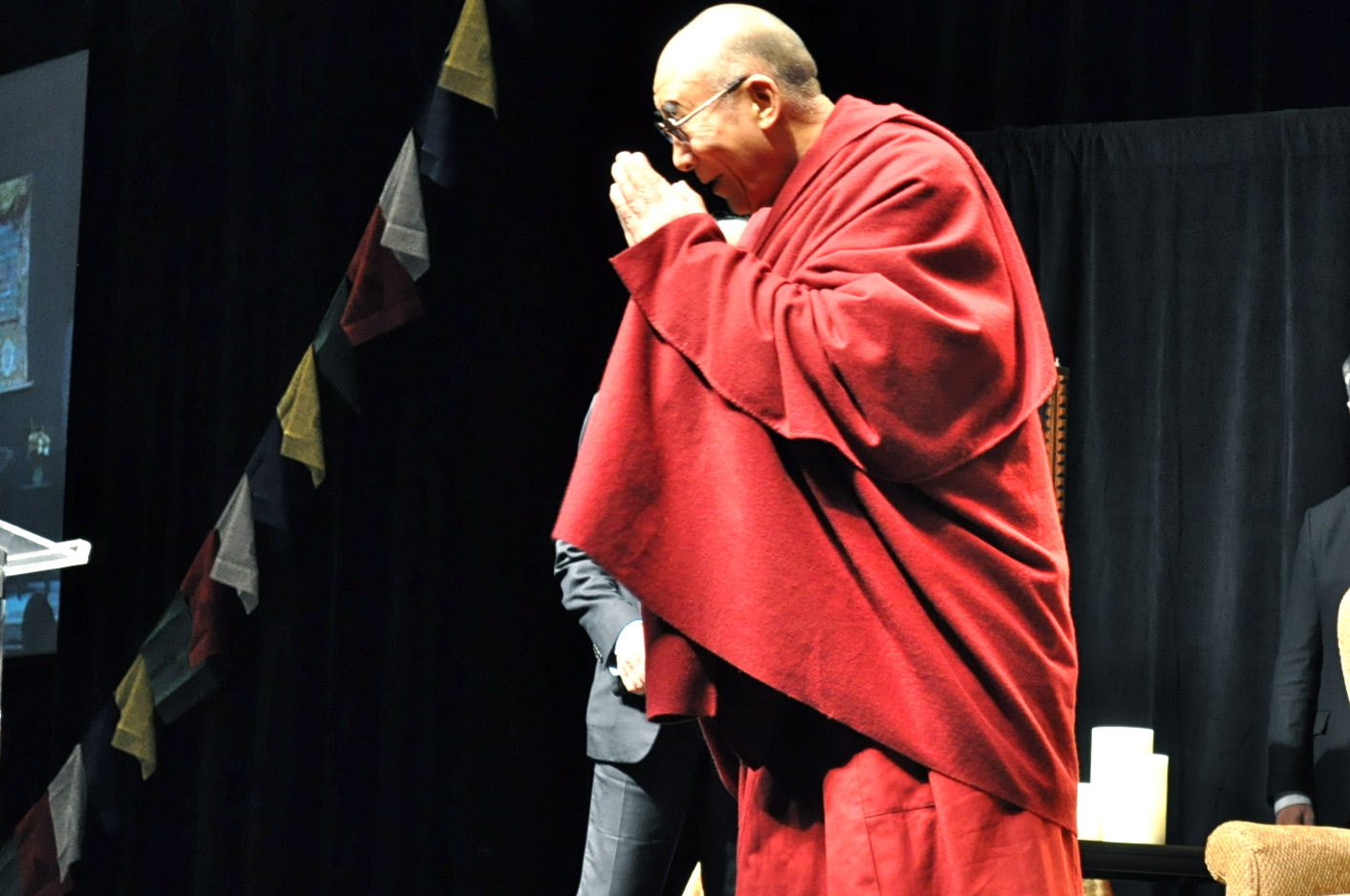Yesterday morning at 10am, more than 7,000 people gathered at the Ottawa Civic Centre to hear the Honourable Dalai Lama speak.
We were welcomed by a number of individuals, including actor Richard Gere, who is a practising Buddhist.

There was a rush of energy when the Dalai Lama made his entrance. He put on his visor and stood up to deliver his Ethics for One World talk. His philosophy goes beyond religion, beyond politics and looks for answers on how to lead a happy, ethical and spiritual life at a human level. Punctuated by personal anecdotes and jokes, the talk was moving and inspiring.
Born in 1935, the Dalai Lama has lived most of his life in exile, as a refugee in India. From these humble beginnings, he has become an influential peacemaker (winning the Nobel Peace Prize in 1989), a globally known spiritual leader and tireless activist.
Spreading the teachings of the Buddha with the message of altruism, love, nonviolence and compassion, the Dalai Lama stands as a powerful voice for those oppressed everywhere, those working for freedom and those struggling to create world peace. He is inspiration: after almost a lifetime of working to free his people, the Tibetan culture is still at risk of dying today, and yet here he stands, humble, funny and at 76 years of age, educating and full of energy.

The public talk did not focus on the specificities of the situation in Tibet, nor did he mention his private talk with PM Stephen Harper other than to thank him once more. Of their private talk, the most open criticism came from Richard Gere, who said, “Change will come to China; the only question is when. If you
want to sell the food, machines, even oil and gas — this isn’t an
issue, but they don’t own your thoughts, your moral backbone.”
Ethics for One World lays out the Dalai Lama’s vision in a secular way, and thus removes us from the shackles of the religious beliefs of Buddhism in regard to sexuality or same-sex doctrine. By the way, sexuality and Buddhism is a complex topic, and even after a few days of research I had a hard time figuring it out, as there are many branches and belief systems of Buddhism and they vary from country to country.
“Buddhism began as an order of celibate monks, which were not permitted to have sex with anyone — hence, they were celibate,” explains Angela Sumegi, assistant professor of humanities and religion at Carleton University and director of the Ottawa Dharma Centre at the Palyul Namdroling Foundation, which supports Tibetan refugee children in India. “In Buddhism there are a few rules for the lay population, including do not kill, steal, lie, engage in irresponsible sexual activity, and do not get intoxicated. The rules for sexual conduct were laid down from a male perspective: you should not have sex with a woman that is already under the guardianship of someone else, et cetera but no specific belief system that I know of condemns homosexuality.”
If the subject of Buddhism and sex interests you, I invite you to read José Cabezón‘s work. He is a gay man and scholar on the subject. A quick excerpt from his Buddhadharma Quarterly should enlighten us all on the Honourable Dalai Lama’s position on the subject:
“On a warm June day in 1997 I walked into the Fairmont Hotel in San
Francisco for a meeting with His Holiness the Dalai Lama. A group of gay
and lesbian Buddhists had requested the audience with His Holiness to
discuss his views on homosexuality and to ask for clarifications about
statements he had made, statements that the organizers saw as
disconcerting. The Dalai Lama began the hour-long meeting by reiterating
his opposition to discrimination on the basis of sexual orientation and
his commitment to “full human rights” for gay, lesbian, bisexual, and
transgender people.”
If, like me, you were in the public today, then you know his entire talk and philosophy is consistent with the queer struggle for human rights and equal freedom.
The Dalai Lama also mentioned the 1,000 Tibetans who have been approved by government to immigrate to Canada. The news is timely given the struggle faced by Tibetan refuges in Arunachal Pradesh, India. These immigrants will need our welcome and support once here, and I encourage you to donate what you can. “It’s often the families that don’t make much money that give,” said the Dalai Lama yesterday. “Most of the donations come from a lot of modest people giving a little bit.”
He talked about expressions of solidarity and the many forms this can take. I encourage you to do what you feel is right. If you want to make a difference, check out palyulottawa.org and tibet.ca.

All photos: Béatrice Borja
 Why you can trust Xtra
Why you can trust Xtra


